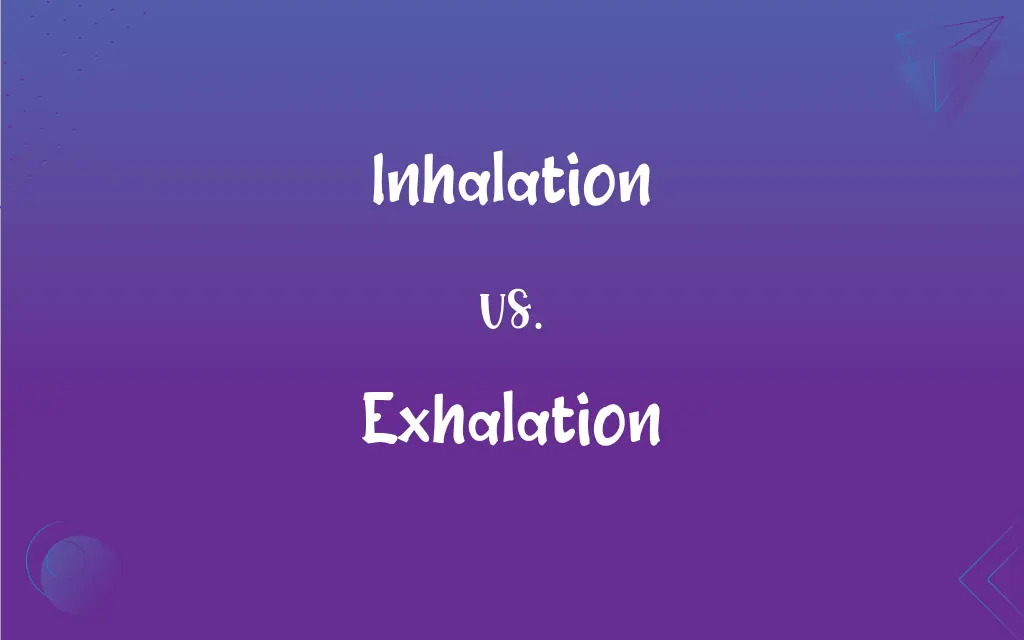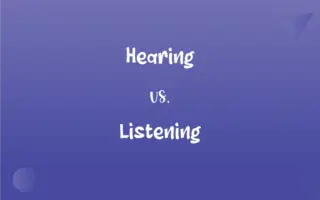Inhalation vs. Exhalation: What's the Difference?
Edited by Janet White || By Harlon Moss || Updated on October 21, 2023
Inhalation is the act of breathing in air; exhalation is breathing out. Both are vital respiratory processes.

Key Differences
Inhalation, in the simplest terms, refers to the process of taking air into the lungs. It's the first part of the breathing cycle and is essential for providing oxygen to the body. Exhalation, on the other hand, pertains to releasing air from the lungs. This process rids the body of carbon dioxide, a waste product of metabolism.
Inhalation is initiated when the diaphragm contracts and the rib muscles pull outward, increasing the lung volume. This reduction in pressure draws air into the lungs. Conversely, during exhalation, the diaphragm and rib muscles relax, decreasing the lung volume, which pushes out the air containing carbon dioxide.
The air inhaled during inhalation primarily fills the alveoli, tiny sacs in the lungs where oxygen exchange occurs. Oxygen from the inhaled air diffuses into the bloodstream, supplying body tissues. In contrast, exhalation ensures that the carbon dioxide produced in the body is effectively removed, maintaining a stable internal environment.
During inhalation, the oxygen-rich air provides the body with the necessary gas for cellular activities. Without inhalation, cells would lack the oxygen required for energy production. Exhalation, meanwhile, prevents the accumulation of carbon dioxide, which could disrupt the body's pH balance if left unchecked.
Inhalation and exhalation are continuous and coordinated processes. They maintain the body's oxygen and carbon dioxide levels, ensuring proper cellular function and overall health.
ADVERTISEMENT
Comparison Chart
Action
Taking in air.
Releasing air.
Purpose
Provides oxygen to the body.
Removes carbon dioxide from the body.
Muscle Activity
Diaphragm contracts, rib muscles pull outward.
Diaphragm and rib muscles relax.
Gas Exchange
Oxygen diffuses into the bloodstream.
Carbon dioxide is expelled.
Effect on Lung Volume
Increases lung volume.
Decreases lung volume.
ADVERTISEMENT
Inhalation and Exhalation Definitions
Inhalation
The act of drawing air into the lungs.
During inhalation, the chest expands as the lungs fill with air.
Exhalation
The act of expelling air from the lungs.
With each exhalation, the body releases carbon dioxide.
Inhalation
A method of absorbing essential oils through breathing.
The soothing inhalation of lavender helps with relaxation.
Exhalation
The outward breath in the respiratory cycle.
During exhalation, the chest contracts as air is pushed out.
Inhalation
Breathing in substances like vapors or aerosols.
Inhalation of toxic fumes can be hazardous to health.
Exhalation
A method of expelling inner thoughts or tensions.
A sigh is a deep exhalation expressing relief or frustration.
Inhalation
Intake of oxygen during respiratory activities.
Deep inhalation is a common technique in meditation practices.
Exhalation
Releasing substances like vapors from the mouth or nose.
Visible exhalation can be seen on cold days as breath.
Inhalation
Introduction of medications into the body via the respiratory system.
Asthma patients often use inhalers for direct inhalation of medicine.
Exhalation
Removal of waste gases from the body during respiration.
Exhalation ensures the body remains free of excess carbon dioxide.
Inhalation
The act or an instance of inhaling.
Exhalation
The act or an instance of exhaling.
FAQs
What initiates inhalation?
Inhalation begins when the diaphragm contracts and rib muscles pull outward.
What makes the sound of exhalation during a sigh?
The sound is due to the rapid exhalation of air through the narrowed airways.
How is carbon dioxide expelled during exhalation?
Carbon dioxide is expelled as we breathe out during exhalation.
Why is exhalation important?
Exhalation removes carbon dioxide, a waste product, from the body.
Is inhalation a passive or active process?
Inhalation is generally an active process due to muscle contraction.
How does the rate of exhalation change during exercise?
It increases to expel more carbon dioxide produced by active muscles.
What might cause difficulties in exhalation?
Conditions like asthma or COPD can restrict airflow, making exhalation difficult.
What muscles are primarily used during inhalation?
The diaphragm and external intercostal muscles are primary muscles used during inhalation.
Can inhalation techniques aid in relaxation?
Yes, certain deep inhalation techniques can help in relaxation and stress relief.
Can controlled exhalation improve lung function?
Yes, controlled breathing exercises can strengthen respiratory muscles and improve lung function.
What primarily enters the body during inhalation?
Oxygen-rich air primarily enters the body during inhalation.
Can inhalation of certain substances be harmful?
Yes, inhalation of toxic fumes or chemicals can be harmful to health.
What role does exhalation play in singing or speaking?
Exhalation provides the airflow needed to produce and control voice.
Why do we often take a deep inhalation before a physical effort?
It provides an oxygen boost to muscles, preparing the body for exertion.
What happens in the alveoli during inhalation?
Oxygen from inhaled air diffuses into the bloodstream in the alveoli.
Is exhalation always passive?
While usually passive, exhalation can be active, as in forceful breathing or singing.
Why might someone exhale loudly when frustrated?
A loud exhalation, or sigh, can be an instinctual release of built-up tension.
How do inhalers work for asthma patients?
Inhalers deliver medication directly to the lungs through inhalation.
Is it possible to control inhalation and exhalation?
Yes, through practices like pranayama or breath control exercises, one can regulate inhalation and exhalation.
Why might someone emphasize exhalation in meditation?
Focusing on exhalation can promote relaxation and help release mental clutter.
About Author
Written by
Harlon MossHarlon is a seasoned quality moderator and accomplished content writer for Difference Wiki. An alumnus of the prestigious University of California, he earned his degree in Computer Science. Leveraging his academic background, Harlon brings a meticulous and informed perspective to his work, ensuring content accuracy and excellence.
Edited by
Janet WhiteJanet White has been an esteemed writer and blogger for Difference Wiki. Holding a Master's degree in Science and Medical Journalism from the prestigious Boston University, she has consistently demonstrated her expertise and passion for her field. When she's not immersed in her work, Janet relishes her time exercising, delving into a good book, and cherishing moments with friends and family.































































